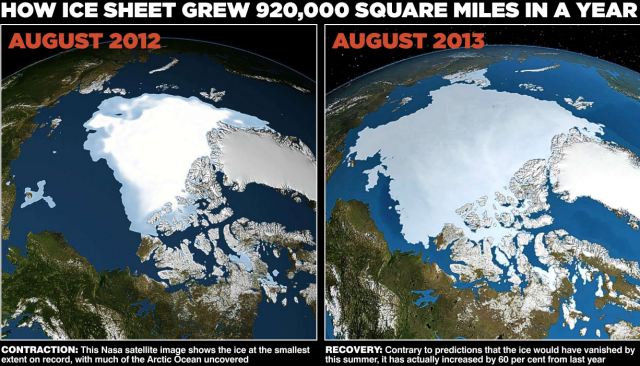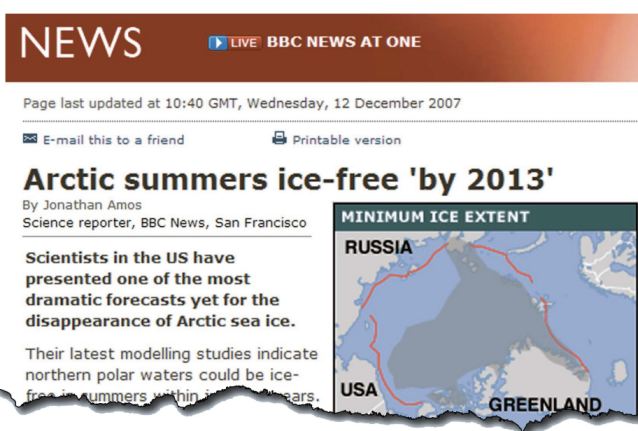A chilly Arctic summer has left nearly a million more square miles of ocean covered with ice than at the same time last year – an increase of 60 per cent. – mailonline 7 Sept 2013.
The rebound from 2012’s record low comes six years after the BBC reported that global warming would leave the Arctic ice-free in summer by 2013.
Instead, days before the annual autumn re-freeze is due to begin, an unbroken ice sheet more than half the size of Europe already stretches from the Canadian islands to Russia’s northern shores.

The Northwest Passage from the Atlantic to the Pacific has remained blocked by pack-ice all year. More than 20 yachts that had planned to sail it have been left ice-bound and a cruise ship attempting the route was forced to turn back.
Some eminent scientists now believe the world is heading for a period of cooling that will not end until the middle of this century – a process that would expose computer forecasts of imminent catastrophic warming as dangerously misleading.
The disclosure comes 11 months after The Mail on Sunday triggered intense political and scientific debate by revealing that global warming has ‘paused’ since the beginning of 1997 – an event that the computer models used by climate experts failed to predict.
The pause – which has now been accepted as real by every major climate research centre – is important, because the models’ predictions of ever-increasing global temperatures have made many of the world’s economies divert billions of pounds into ‘green’ measures to counter climate change.
Those predictions now appear gravely flawed.
THERE WON’T BE ANY ICE AT ALL! HOW THE BBC PREDICTED CHAOS IN 2007
Only six years ago, the BBC reported that the Arctic would be ice-free in summer by 2013, citing a scientist in the US who claimed this was a ‘conservative’ forecast. Perhaps it was their confidence that led more than 20 yachts to try to sail the Northwest Passage from the Atlantic to the Pacific this summer. As of last week, all these vessels were stuck in the ice, some at the eastern end of the passage in Prince Regent Inlet, others further west at Cape Bathurst.
Shipping experts said the only way these vessels were likely to be freed was by the icebreakers of the Canadian coastguard. According to the official Canadian government website, the Northwest Passage has remained ice-bound and impassable all summer.
The BBC’s 2007 report quoted scientist Professor Wieslaw Maslowski, who based his views on super-computer models and the fact that ‘we use a high-resolution regional model for the Arctic Ocean and sea ice’.
He was confident his results were ‘much more realistic’ than other projections, which ‘underestimate the amount of heat delivered to the sea ice’. Also quoted was Cambridge University expert Professor Peter Wadhams.

He backed Professor Maslowski, saying his model was ‘more efficient’ than others because it ‘takes account of processes that happen internally in the ice’.
He added: ‘This is not a cycle; not just a fluctuation. In the end, it will all just melt away quite suddenly.’
Al Gore: “Entire north polar ice cap will be gone in 5 years”
On the 13th of December 2008, in Saarland, Germany, at the opening of the new prehistoric exhibit, Gondwana Park, Al Gore stated that the “entire north polar ice cap will be gone in 5 years.”
ABC report – Arctic Ocean ice could melt by 2013 |
||
AM – Thursday, 13 December , 2007 08:08:00Reporter: Barbara Miller
|
||

.jpg)